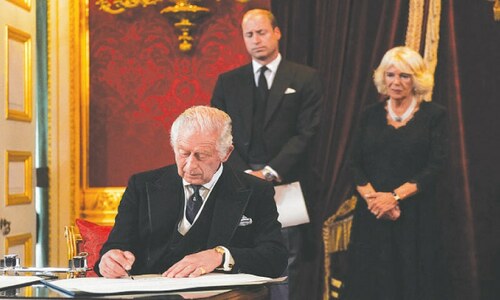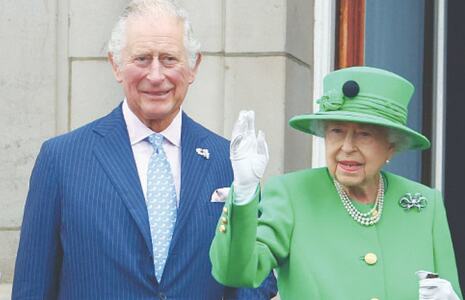
LONDON: British police faced criticism from civil liberties groups on Tuesday over their treatment of anti-monarchy protesters who have publicly challenged King Charles III’s accession to the throne and the groundswell of public support for the royal family.
Footage went viral on social media of a female protester holding aloft a “Not My King” protest placard who was then confronted by at least four officers outside the UK parliament in London.
She was seen being escorted away from the spot, and was reportedly made to stand at another location away from the gates of parliament.
Lawyer and climate activist Paul Powlesland also wrote on Twitter that he had been warned by an officer that he risked arrest after he held up a blank piece of paper opposite parliament.
Truss terms fundamental right to protest a keystone of democracy
“He confirmed that if I wrote, ‘Not My King’ on it, he would arrest me under the Public Order Act because someone might be offended,” he wrote alongside video showing him talking to an officer.
Britain is in national mourning for Queen Elizabeth II, with the death of the 96-year-old monarch provoking a rare moment of national unity amid an outpouring of sympathy for the royals.
Space of dissent
But it has also raised questions about the space for dissent, with several civil liberties groups warning that police are failing to respect the rights of the small minority of anti-monarchists.
“If people are being arrested simply for holding protest placards then it is an affront to democracy and highly likely to be unlawful,” Big Brother Watch, a non-profit non-party British civil liberties and privacy campaigning organisation, said in a statement.
“Police officers have a duty to protect people’s right to protest as much as they have a duty to facilitate people’s right to express support, sorrow, or pay their respects.” In another incident, a 45-year-old man was arrested in Oxford in southern England on Sunday after he shouted, “Who elected him?” during a public proclamation of Charles III’s accession.
Jodie Beck, from the Liberty campaign group, said the right to protest was “a vital part of a healthy and functioning democracy.” She said: “It is very worrying to see the police enforcing their broad powers in such a heavy-handed and punitive way to clamp down on free speech and expression.”
‘Fundamental right’
London’s Metropolitan Police force appeared to acknowledge the overzealous actions of some officers late on Monday.
“The public absolutely have a right to protest,” said deputy assistant commissioner Stuart Cundy.
“We have been making this clear to all officers involved in the extraordinary policing operation currently in place and we will continue to do so.”
The queen’s coffin was put on public display for the first time on Monday in Edinburgh following a silent procession that saw a young man shout out at Prince Andrew, the queen’s second son, as he marched behind the hearse.
The heckler, who called Andrew a “sick old man” in reference to his links to American paedophile financier Jeffry Epstein, was shown being bundled away and escorted by police.
Bystanders reacted by shouting “God Save the King!” Scottish police confirmed that two people had been arrested and charged on Monday for public order offences.
Another woman who held an “abolish monarchy” sign at a proclamation ceremony for King Charles III in Edinburgh on Sunday has also been charged, reports said.
“Obviously this is a period of national mourning for the majority, the vast, vast majority of the country,” a spokesman for Prime Minister Liz Truss told reporters in London on Tuesday.
“But the fundamental right to protest remains a keystone of our democracy.” The 1986 UK Public Order Law gives the police powers of arrest for people judged to be guilty of causing “harassment, alarm or distress” through “threatening words or behaviour, or disorderly behaviour,” including by holding up signs.
Published in Dawn, September 14th, 2022














































